Serving 1,017 students in grades Prekindergarten-8, Frank Borman School ranks in the bottom 50% of all schools in Arizona for overall test scores (math proficiency is bottom 50%, and reading proficiency is bottom 50%).
The percentage of students achieving proficiency in math is 13% (which is lower than the Arizona state average of 35%). The percentage of students achieving proficiency in reading/language arts is 17% (which is lower than the Arizona state average of 40%).
The student:teacher ratio of 23:1 is higher than the Arizona state level of 17:1.
Minority enrollment is 99% of the student body (majority Hispanic), which is higher than the Arizona state average of 66% (majority Hispanic).
Quick Stats (2025)
- Grades: Prekindergarten-8
- Enrollment: 1,017 students
- Student:Teacher Ratio: 23:1
- Minority Enrollment: 99%
- Overall Testing Rank: Bottom 50% in AZ
- Math Proficiency: 13% (Btm 50%)
- Reading Proficiency: 17% (Btm 50%)
- Science Proficiency: 11% (Btm 50%)
- Source: National Center for Education Statistics (NCES), AZ Dept. of Education
School Overview
Frank Borman School's student population of 1,017 students has declined by 5% over five school years.
The teacher population of 45 teachers has declined by 6% over five school years.
Grades Offered
Grades Prekindergarten-8
Total Students
1,017 students
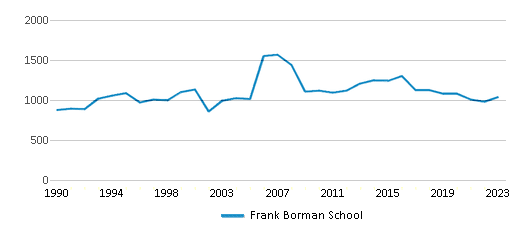
Gender %
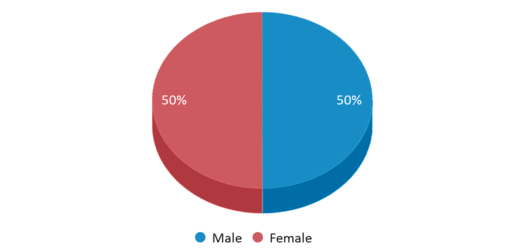
Total Classroom Teachers
45 teachers
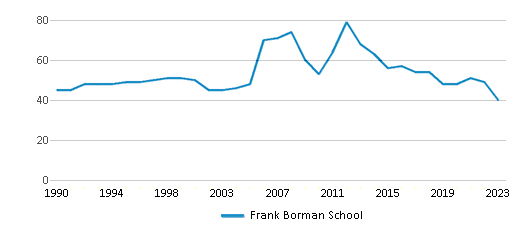
Students by Grade
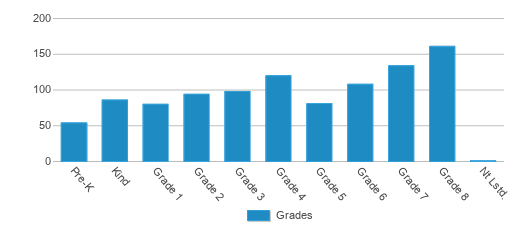
School Calendar
School Rankings
Frank Borman School ranks within the bottom 50% of all 1,956 schools in Arizona (based off of combined math and reading proficiency testing data).
The diversity score of Frank Borman School is 0.21, which is less than the diversity score at state average of 0.66. The school's diversity has stayed relatively flat over five school years.
Overall Testing Rank
#1684 out of 1956 schools
(Bottom 50%)
(Bottom 50%)
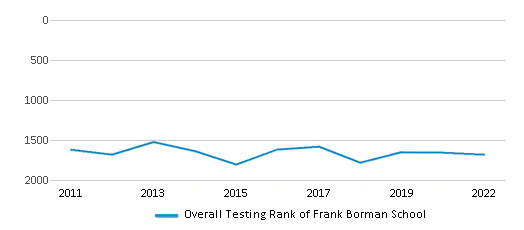
Math Test Scores (% Proficient)
13%
35%
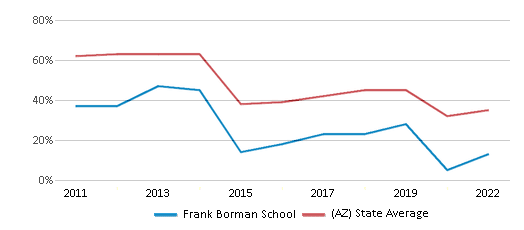
Reading/Language Arts Test Scores (% Proficient)
17%
40%
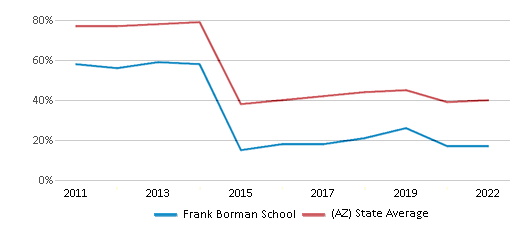
Science Test Scores (% Proficient)
11%
24%
Student : Teacher Ratio
23:1
17:1
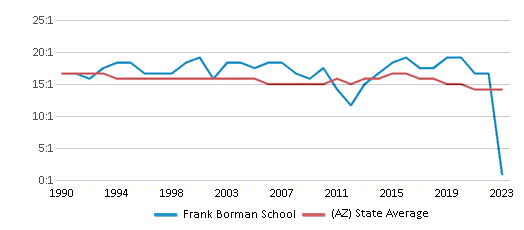
American Indian
2%
5%
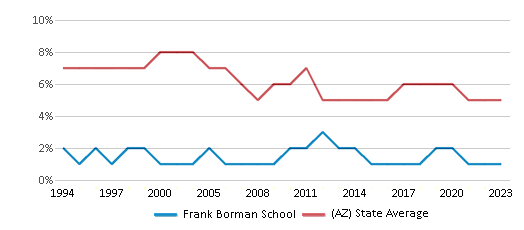
Asian
1%
3%
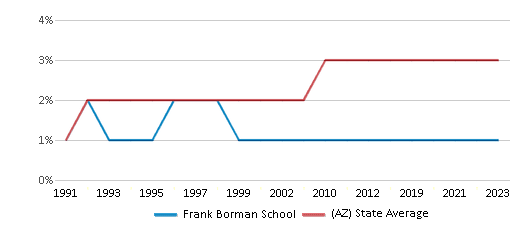
Hispanic
89%
48%
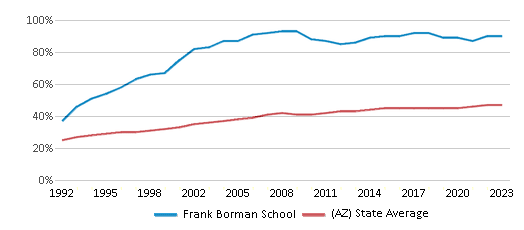
Black
6%
6%
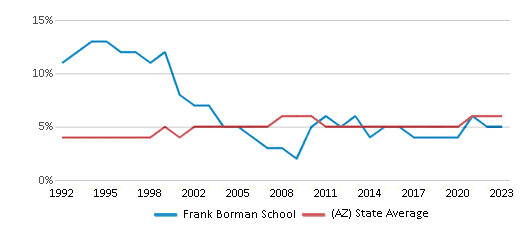
White
1%
34%
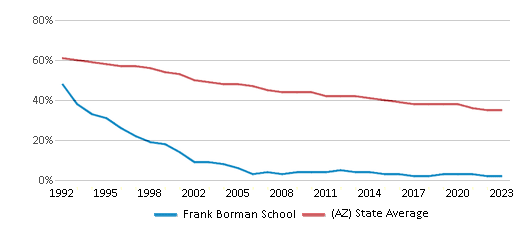
Hawaiian
n/a
n/a
Two or more races
1%
4%
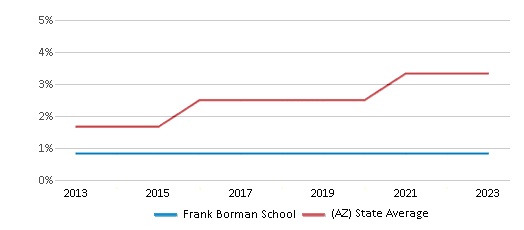
All Ethnic Groups
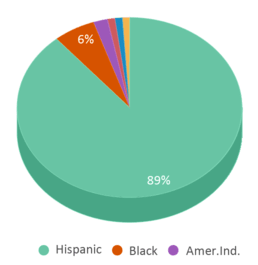
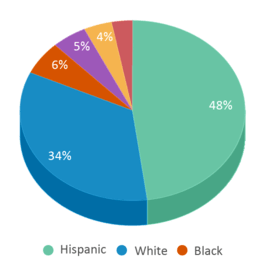
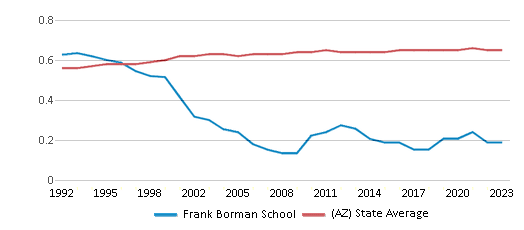
Eligible for Free Lunch
100%
40%
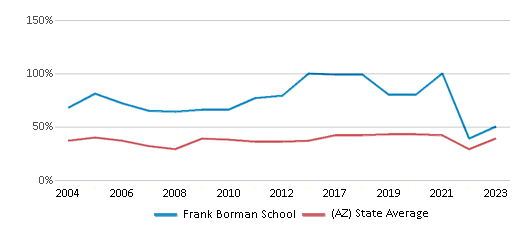
Eligible for Reduced Lunch
6%
7%
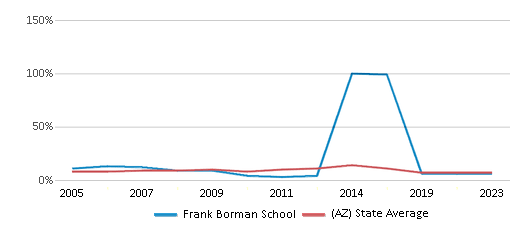
School Statewide Testing
School District Name
Source: National Center for Education Statistics (NCES), AZ Dept. of Education
Profile last updated: 02/09/2025
Frequently Asked Questions
What is Frank Borman School's ranking?
Frank Borman School is ranked #1684 out of 1,956 schools, which ranks it among the bottom 50% of public schools in Arizona.
What percent of students have achieved state testing proficiency in math and reading?
13% of students have achieved math proficiency (compared to the 35% AZ state average), while 17% of students have achieved reading proficiency (compared to the 40% AZ state average).
How many students attend Frank Borman School?
1,017 students attend Frank Borman School.
What is the racial composition of the student body?
89% of Frank Borman School students are Hispanic, 6% of students are Black, 2% of students are American Indian, 1% of students are Asian, 1% of students are White, and 1% of students are Two or more races.
What is the student:teacher ratio of Frank Borman School?
Frank Borman School has a student ration of 23:1, which is higher than the Arizona state average of 17:1.
What grades does Frank Borman School offer ?
Frank Borman School offers enrollment in grades Prekindergarten-8
What school district is Frank Borman School part of?
Frank Borman School is part of Cartwright Elementary District (4282) School District.
In what neighborhood is Frank Borman School located?
Frank Borman School is located in the Maryvale Village neighborhood of Phoenix, AZ. There are 65 other public schools located in Maryvale Village.
School Reviews
5 10/8/2015
My daughter was attending a high known preparatory academy in which she was in a waiting list for. I had to withdraw my daughter from that A school to place her in Frank Borman Elementary.
At the A school the assistant Principal kept calling my Husband and myself at every day since the day our daughter started school there. She stated that our daughter needs to be medicated due to she suffers from separation anxiety. Separation Anxiety? Really? I refuse to jump into any conclusion, so my husband and I decided to simply switch schools, since the A school was not willing to help us out by just keeping her in class. It seem as if our 5 year old daughter out smarted them and knew that if she would cry they would immediately call us. They did not want to deal with her.
1 in 7 kids have separation anxiety, its normal Per our pediatrician, you simply need to be more patient with the child and do not punish them because this only creats more stress to them.
Our 5 year old daughter that refuse to go to school, attends Frank Borman Elementary and is happy to go to school every day. She now has 5 friends, and her teacher Mrs. Perez is awesome.
Review Frank Borman School. Reviews should be a few sentences in length. Please include any comments on:
- Quality of academic programs, teachers, and facilities
- Availability of music, art, sports and other extracurricular activities
Recent Articles

What Is A Charter School?
Explore the world of charter schools in this comprehensive guide. Learn about their history, how they operate, and the pros and cons of this educational innovation. Discover key facts about charter schools, including admission policies, demographics, and funding, as well as what to look for when considering a charter school for your child.

10 Reasons Why High School Sports Benefit Students
Discover the 10 compelling reasons why high school sports are beneficial for students. This comprehensive article explores how athletics enhance academic performance, foster personal growth, and develop crucial life skills. From improved fitness and time management to leadership development and community representation, learn why participating in high school sports can be a game-changer for students' overall success and well-being.

February 05, 2025
Understanding the U.S. Department of Education: Structure, Impact, and EvolutionWe explore how the Department of Education shapes American education, from its cabinet-level leadership to its impact on millions of students, written for general audiences seeking clarity on this vital institution.







